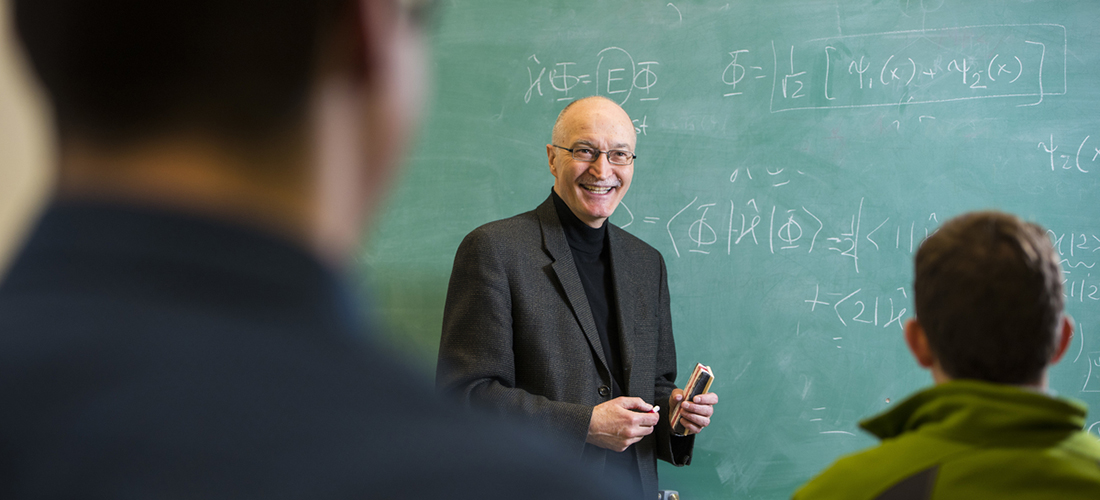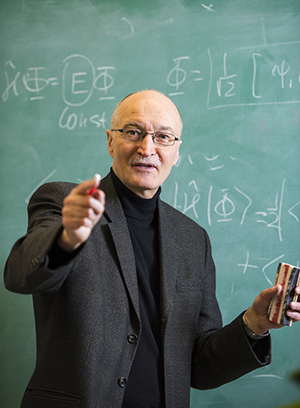
Q: What do you teach?
A: I teach 1st-year chemistry, 2nd-year introduction to quantum chemistry, and 4th-year/graduate computational quantum chemistry: from fundamentals of chemistry to applications of quantum theory.
Q: Why should people learn about it?
A: About chemistry? Because it's at the foundation of so many other branches of science and it gives us a great understanding of processes at a fundamental molecular level in many areas such as biology, pharmacology, technology, ….
"Finding out that you can describe nature with mathematical equations - that's why today I teach quantum chemistry. I try to share with students the awe of that realization."
About computational chemistry? Because it allows us to explore molecular scenarios that are often inaccessible by experiment. Think of molecules in the interstellar space, whose presence we can detect by spectroscopic means: using computers on Earth we can probe what they are, what their properties are, and can model their reactions using computational tools that range from our laptops to supercomputers (such as the ones available through WestGrid and Compute Canada).
Q: What are some of its "real-world" applications?
A: We can predict new molecules that do not exist (or are not known) and study their properties in a computer, in silico as opposed to in vitro or in vivo. Examples of real-world applications are designs of better catalysts, or searching for molecules that could supplement or replace the existing anti-cancer drugs.
Q: What's the coolest thing about this subject area?
A: Though we have great theoretical methods and computer programs, and computers are getting faster, we still have so much to do, including developing better algorithms and coding programs that utilize the capabilities of new architectures. For example, in the past decade or so, computational chemists adapted to numerical computing the Graphical Processing Units (GPUs) with their superior processing capabilities, such as those demonstrated in computer games and animated movies that blur the boundary between movies and computer graphics. Some of the fastest computations that I can do are carried out in parallel on NVIDIA Tesla cards mounted on a Linux computer. (These cards are similar to those that power the fastest supercomputers such as NUDT's Tianhe-1A or Cray's Titan.) Prices of these GPUs are quite low, driven by the insatiable market for realistic computer games.
 Q: What's your favourite kind of teaching and/or learning space, and why?
Q: What's your favourite kind of teaching and/or learning space, and why?
A: I try to involve students in a discourse, whether in a class of 20 or 200. I strive to encourage critical thinking, to search, and to discover. It's easier to do this with fewer students, but it's worth the effort even in large classes. I also try to bring in examples of scientists, their discoveries, their mistakes, and their personal histories.
Q: What was your favourite learning experience as an undergrad, and how do you incorporate that experience into teaching your students?
A: Finding out that you can describe nature with mathematical equations - that's why today I teach quantum chemistry (except that as an undergrad I thought that the possibilities of such description were limitless whereas today I know the limitations). I try to share with students the awe of that realization. My other undergraduate learning experience was as a parent of two undergrads: As my two daughters were going through the University, we talked at home about how some of their instructors and TAs made a huge difference in their studies. And I realized that we, as instructors, not only affect the lives and formulate opinions of each student that we teach, but also of their two parents, four grandparents, siblings… Their perception of art and science is only as good as our teaching. That's a huge societal responsibility for instructors!
Q: What is one thing that people would be surprised to know about you?
A: I learned how to drive in my mid-thirties, with my wife being my primary teacher in a car with an automatic gear box and my friend teaching me how to start up-hill in a car equipped a standard gear box.